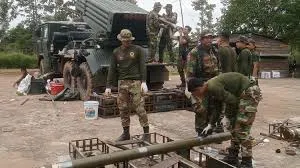At least 12 people have died in intense clashes between Thai and Cambodian troops along their disputed border, Thai authorities reported on Thursday. The violence, which erupted early in the day, marks a significant escalation in a long-standing territorial dispute between the two Southeast Asian nations, centered around a contested area near an 11th-century Khmer-Hindu temple.According to Thailand’s military, 11 civilians—including an eight-year-old and a 15-year-old—and one soldier were killed in the provinces of Surin, Ubon Ratchathani, and Srisaket. Several others were wounded. Cambodia has not yet confirmed any casualties on its side.
The conflict began with an exchange of gunfire, with both nations blaming each other for initiating the hostilities. Thailand accused Cambodian forces of using drones for surveillance and firing rockets, prompting Bangkok to respond with airstrikes on Cambodian military targets. Cambodia, however, claimed Thai troops violated a prior agreement by advancing toward the temple, sparking the confrontation.
The dispute traces back over a century to borders drawn during France’s colonial rule over Cambodia. Tensions flared in 2008 when Cambodia sought UNESCO World Heritage status for the temple, a move Thailand strongly opposed. Sporadic clashes have occurred since, with casualties on both sides. The situation worsened in May after a Cambodian soldier was killed, further straining relations.
In recent weeks, both countries have tightened border controls, with Cambodia banning Thai imports like fruits, vegetables, power, and internet services. Troop deployments have also increased along the border.
Thailand has closed its border with Cambodia and evacuated 40,000 civilians to safer areas. “The fighting is really serious. We’re in the middle of evacuating,” said Sutian Phiwchan, a resident of Ban Dan district in Thailand’s Buriram province.
Cambodia has downgraded diplomatic ties, accusing Thailand of using “excessive force.” Cambodian Prime Minister Hun Manet expressed a desire for a peaceful resolution but stated that his country would respond to “armed aggression” with force. Thailand’s acting premier, Phumtham Wechayachai, called the situation “delicate” and urged a resolution in line with international law.
The current clashes, while intense, have de-escalated relatively quickly in the past. However, analysts warn that weak leadership on both sides could prolong the standoff. Cambodia’s Hun Manet, still establishing his authority under the shadow of his father, former leader Hun Sen, faces pressure to assert nationalist credentials. In Thailand, a fragile coalition government backed by former Prime Minister Thaksin Shinawatra is grappling with internal instability, exacerbated by a recent diplomatic spat involving a leaked conversation between Thaksin and Hun Sen.
While a full-scale war appears unlikely, the lack of strong leadership willing to de-escalate raises concerns about further violence in the region. Both nations have urged citizens to avoid border areas as tensions persist.
Thursday, July 24, 2025
Author: DhakaGate Desk
Note For Readers: The CEO handles all legal and staff issues. Claiming human help before the first hearing isn't part of our rules. Our system uses humans and AI, including freelance journalists, editors, and reporters. The CEO can confirm if your issue involves a person or AI.
এ সম্পর্কিত আরও খবর
- ব্লগার মন্তব্
- ফেইসবুক মন্তব্য









